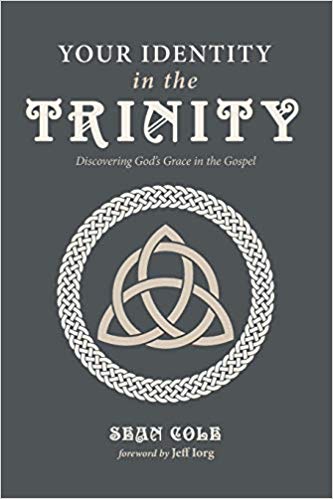Sean Cole, born in Kansas City, MO, is pastor at Emmanuel Baptist Church in Sterling, Colorado. His favorite movie is Better off Dead, he has a beagle named Kimber, his favorite smell is (he sniffed some potpourri in 2nd grade at a department store and this has affected his smell to this day and he can’t smell a lot of thing but he does like cinnamon rolls right out of the oven, his first job was at McDonald’s making French fries and when not engaged in Spiritual disciplines he enjoys working out at the gym. You can find his bio, sermons, books, etc at his site here.
Back to the Basics of Christianity
Interview with Sean Cole
Loading...
In your recent book “Your Identity in the Trinity” you seem to really have your finger on the pulse with the blindspots and needs of modern American Christianity, as a result you do well in diagnosis and remedies. That said, I really really want to know what where some of the specific half-truths, over or under-emphasis, experiences or patterns that caused you to take up pen?
I grew up in a great church culture, but I wasn’t really taught the implications of the gospel in how to grow as a Christian. In my struggle with sin, I was told to “let go and let God” and that any striving or struggle in growing to be like Jesus was an act of my flesh and counterproductive. I was never taught how my identity in each Person of the Trinity was the foundation for both my assurance of salvation and my growth in godliness. I’m a very task-oriented person and I resonate with being told what to “do” in order to “get busy” serving Jesus. I didn’t have that great of a grasp on who I was in Christ. In seminary, one of my professors heavily emphasized “being before doing” and that has stuck with me since. In addition, the book Communion with God by the Puritan John Owen had a tremendous impact on my understanding how I relate to each Person of the Trinity. In short, I think there is a heavy emphasis in evangelicalism on practical application without the foundation of our identity in Christ. There is a lot of pragmatism on the popular level without helping believers understand how the depths of theology actually impact their daily lives.
What do you see as one of the most fundamental human itches that we are trying to scratch with lots of sex, fast food, selfies, religious activity, etc., and how do the implications of the Gospel lift up off the pages of my Bible and touch on those that literally dont just change my mind but my own heart and emotions and desires?
In today’s culture, one of the highest values is self-expression. We hear people all the time saying, “I just want to be true to myself.” This narcissistic attitude impacts all of life where people are desperately searching for significance and approval from others. Many stress out that they did not get enough “likes” to one of their Facebook posts. We see the gender confusion taking our culture by storm where people are defying clear biblical norms of male and female identities rooted in God’s plan of creation. The human itch that people want scratched is to be accepted for who they are and to have the freedom to express themselves no matter what the consequences may be.
The beauty of the gospel is that for believers in Christ, the Father chose them before the foundation of the world, adopted them into His family, and showers them with extravagant love. Jesus did not wait for us to get our act together in order to love us, but demonstrated mercy on the cross by dying for us when we were rebels against Him.
The gospel takes a spiritually dead sinner and transforms them into a new creation with extraordinary spiritual blessings. So many people struggle with who they are. They want significance. They want acceptance. And yet they are seeking these things in all the wrong places. Some seek significance in flagrant immorality, while others seek significance in moral living—which sadly are both devoid of the power of the gospel.
The gospel announces a radical message that we are hopeless, helpless, and hell-bound in our sins, but that Christ raises us to new life and grants us a brand-new identity in the Trinity. We are chosen, adopted, and accepted by the Father; purchase, forgiven, and righteous in the Son; regenerated, indwelt, and sanctified by the Spirit. The Triune God satisfies the deepest longings of the human heart by giving us something that is indescribable—the very life of God in the soul of man!
Many of us these days have short attention spans, are always on the move, and bounce from idea to idea to idea. With that in mind, what is a simple but powerful truth of our being “in the Trinity” that we can commit to memory and pray into?
The thesis of my book centers of three truths related to each Person of the Trinity that define our identity. I focus on what each Person has done for us in our salvation. I think it would be helpful to commit this to memory and also to incorporate into one’s prayer life.
As a believer, you are: chosen, adopted, and accepted by the Father; purchased, forgiven, and righteous in the Son; regenerated, indwelt, and sanctified by the Spirit.
It would be helpful to meditate on these truths or take one truth at a time and spend time thanking and praise that Person of the Trinity for His work in your life.
Let me give you an example in how you can incorporate this into your prayer life by taking being adopted by the Father. When you pray, you can address the Father with something like this: “Father in heaven, I am so humbled that you would dare adopt me into Your family. I know that before You saved me, I was a rebel. I was hostile to you. I could care less about your glory and Kingdom. But now since you adopted me, I have a home with you. I have permanent access to You. I can bask in Your love for me. I have the security of being in a family. I have the confidence that you’re my Father and will never let me go. Today, I praise you that I am adopted by You as my Great Father.”
What is the “Gospel” and what practical implications does the Gospel make in my everyday life?
The gospel is an announcement of good news concerning the historical reality of the death, burial, and resurrection of Jesus Christ as Lord of lords. The gospel does not tell us what we must “DO” in order to earn God’s favor or merit forgiveness, but instead, announces to us what Christ has already DONE to secure our salvation.
I often hear people say that we need to “live” the gospel. While I understand what they mean, theologically this is not correct. The gospel is the life that Jesus lived and the death He died and the grave He overcame. The gospel is news to be heard and believed, not something we necessarily can live out.
Now with that being said, the gospel has major implications in how we live our everyday life. I am reminded of what Paul says in Philippians 1:27 : “Only let your manner of life be worthy of the gospel of Christ, so that whether I come and see you or am absent, I may hear of you that you are standing firm in one spirit, with one mind striving side by side for the faith of the gospel.”
One of the key themes in my book is this statement: The more you look AT Jesus, the more you begin to look LIKE Jesus. This comes from both Romans 8:29 and 2 Corinthians 3:18. God’s glorious plan for us as believers is to become transformed into the image of Jesus His Son. When we saturate ourselves in the Scriptures, dwell upon the glories of the gospel, and fix our eyes on Jesus, the Holy Spirit does this powerful work within us to conform us to Christ. There are two ditches that many Christians can fall into on a daily basis: First, we can become legalistic and prideful. We keep running on the treadmill of self-effort going from this conference or Bible study or this ministry to the next in order to keep busy doing things so that we can make sure God still loves us. We can look down on others who are not up to our “level of spiritual maturity.” On the other hand, we can also fall into the ditch of despair and guilt and frustration with our lack of progress in godliness and begin to wonder if God ever loved us in the first place. We get so discouraged we simply give up pursuing Him. Both these ditches—inflated pride and deflating guilt—are enemies of the gospel. The gospel recalibrates us out of these ditches and set us on the firm foundation of our gospel identity. Because the Father loves us, Jesus died for us, and the Holy Spirit lives inside of us, we are secure in our salvation and have the assurance of our permanent standing before a holy God. Out of this identity, we then can begin to serve the Lord out of joy, instead of legalism or guilt.
What is “sin” and what is so terrible about it when I do sin? And what is my motivation to not sin?
The Bible defines sin in many ways but fundamentally it is a continual falling short of glorifying God for who He is and violating His Law. The first issue of God’ glory relates to idolatry in that we fail to worship God alone as our greatest treasure. The second issue of the Law relates to how we continually break His revealed will in the Bible by our actions.
All sin stems from a lie that obedience to God does not pay off in the end. Sin does a masterful job of deceiving us into believing the lie that it is good for us to surrender to our lusts. We buy into the myth that sin brings pleasure, enjoyment, satisfaction, and joy. Sin makes a tremendous promise that it cannot fulfill. Sin promises happiness, excitement, and fulfillment, but these benefits are not benefits at all. Sin has tricked us, and these are only fleeting pleasures.
Hebrews 11:24–25 states, “By faith Moses, when he was grown up, refused to be called the son of Pharaoh’s daughter, choosing rather to be mistreated with the people of God than to enjoy the fleeting pleasures of sin.” This passage tells us that sin is pleasurable. We would not sin if we did not think it brought us pleasure. Sin feels good. Sin is fun. Sin promises excitement and allures us with the prospect of enjoyment. But these promises are empty. These pleasures of sin are fleeting. They are temporary. They only last for a season. Sin is so deceitful because it tricks us into believing that disobedience is fun. If we are honest with ourselves, we know all too well that sin can be fun. We happily rush into sin because we believe that we will experience ultimate pleasure at that moment. But what does iniquity reap in the end? We experience the crash and burn of this deception when the fleeting pleasure passes.
What is God’s end goal for this world, all humans of this world, and me personally? Where is He taking it and what does it look like for me to be a part of that goal, and how can I have a role and purpose in that goal, and find meaning, and value, and my joy in that goal?
God is foremost concerned with Himself as Sovereign Creator and Sustainer of all things. Everything begins and ends with His glory alone. God’s end goal for this world is the culmination of His plan to bring all things under the Lordship of Jesus in the new heavens and new earth where believers will dwell in perpetual intimacy with the Triune God. For me personally, I am confident that the Father chose me before the foundation of the world, Jesus died on the cross to forgive and accept me, and the Holy Spirit lives inside of me as the guarantee that I will spend eternity in heaven.
My role or purpose in this goal is to live each day to the glory of God by resting secure in this identity in the Trinity and to share the gospel with those who do not yet know how they can be forgiven, transformed, and also share this identity.
I find joy in God’s sovereignty that what He began, He will ultimately complete. No plan or purpose can thwart His will. I am such a small part of His grand story, but I am part of it, nonetheless. I rejoice that He quiets me with His love and Jesus intercedes for me and that the Holy Spirit is working deeply in my heart to become like Christ.
This is not a privatized, individualized experience of me on an island by myself, but I get to share in the joy of being part of a church family on this journey together where we can all grow into maturity in our identity in the Trinity.
How can I, as a Christian who believes the Gospel and affirms orthodoxy, be compelled to genuinely desire God and the kingdom of God enough to become a true disciple, one who is willing to consider all things loss in comparison with knowing and loving Jesus?
In my book, I focus the latter chapters on the means of grace that help Christians grow in their identity. The first is Scripture Saturation which involves reading, studying, memorizing, meditating, and obeying God’s Word. One of the practices I think we often ignore is meditating on Scripture. Meditating is like letting your mind become saturated over time with God’s word. Meditating can be analogous to taking chicken or beef and letting it marinate in a sauce before you cook it. Meditation involves allowing the word to soak in your heart and soul—to think about it, ponder it, and to let it takes its full effect in your life.
Meditating on Scripture involves focusing your mind on the truths of Scripture, so you can not only understand what it says, but more importantly, obey what it says in all aspects of your daily life. I have found that journaling, while not prescribed in the Bible as a mandatory practice, is helpful in this process of meditation. I usually take a smaller portion of Scripture and write out my thoughts, questions, and personal application in a journal and then use these insights to inform my praying. I usually pray back the truths I have just read so that I can internalize them and think more deeply about them through the day. My advice is: Don’t rush—take time! It is better to read a small amount of Scripture and meditate on it than to read an extensive section without meditation.
In addition, using the Lord’s Prayer as a model helps us stay focused during our daily prayer times.
We must not become legalistic about these practices and think that by doing them, we win favor with God or improve our standing. As justified believers, we rest in a permanent position of acceptance before God on account of the imputed righteousness of Christ. In our sanctification, God does command us to put forth effort by his grace to grow in godliness.
As a Christian, at the end of a long day (when I have done what I ought not to have done – and not done what I ought to have done) what are God’s thoughts of me when I lay down my head at at night and fall asleep?
The gospel tells us that God accepts us on the basis of Christ’s righteousness and that on our best days when we are living wonderfully holy lives and on our worst days when we are struggling with sin he does not love us any more or any less based upon our performance. On those days when you’re arguing with your spouse, speeding in traffic, and getting frustrated with your dog, God does not love you less. Or on those days when you’re hitting on all your spiritual cylinders and having your daily devotional time, serving at a soup kitchen, and volunteering at VBS, he does not love you more. He loves us constantly and permanently based upon Christ’s performance and his finished work on the cross. When we trusted Christ for salvation, all of our sins were credited or transferred to him, and his perfect righteousness and perfect record of obedience were credited or transferred to us. Based upon what Christ alone has done, God the Father can now declare us not guilty, and permanently adopts into his family as dearly loved children. When I put my head on my pillow at night, I rest secure in the security of these truths.
What is God’s mission given to us and how do I fulfill it without it becoming a feeling of another thing I have to do for God? And based upon that, What is needed at the personal, and church level to shape culture and to be on strategic mission?
Jesus gave the church a crystal-clear mission: he commands us to make disciples of all nations through the preaching of the gospel so that rebels will bow their knees to his lordship and worship him alone. The Father sent Jesus as our Redeemer on a rescue mission to seek and save the lost, and calls the church to embrace this mission for the ultimate goal of glorifying him.
In some evangelical circles, believers feel a weight of pressure to try to “get people saved” using pushy marketing techniques. We need a clear understanding of evangelism that takes the pressure off our anxieties in sharing our faith. Evangelism involves verbally telling sinners about the death, burial, and resurrection of Jesus Christ and then commanding them with urgency to repent and believe in him.
You don’t save anyone. You can’t save anyone. All you have to do is share the good news. All you have to do is open your mouth and tell others about Jesus. As your lifestyle consistently backs up your message, God will do his sovereign work of bringing sinners to Christ. This reality should free you up to share the gospel with confidence knowing that God is in control. We need to engage our culture, present the whole gospel, and do this in winsome and creative ways to build bridges of understanding. I encourage you to take a risk with the gospel and realize its inherent power. When you testify about Jesus, sometimes you will receive seething hatred. Other times curiosity. Other times ambivalence. Thankfully there are those times when you see God convert a sinner by his grace alone. God is sovereign, and he is using you to share the gospel faithfully to a lost culture which desperately needs the hope of redemption only found in Jesus Christ.
I think what is needed at a personal level to become more strategic in our mission are two things: (1) a broken heartedness over the reality of eternal hell, and (2) a boldness to share the full gospel in a culture that hates absolute truth.
At the church level, you cannot “program” a culture of evangelism. As a pastor, I must model evangelism and pray for God to create a gospel-centered culture where everyone is telling the good news to others out of a heart of love for sinners and a desperate dependence on the Holy Spirit to bring new life to those dead in sin.
For you personally, what has been the most compelling or powerful aspect of the story of the Bible that you delight in, has come to you fresh, and resulted in you loving God more and being excited to be a part of God’s story?
For the past year, I have been preaching through the book of Exodus. I have seen the glories of Christ come alive in almost every chapter in types and shadows. I have grown in my love for the transcendent I AM God as revealed in Exodus as well as how everything points to Christ as the one Mediator between a sinful people and a holy God.
Many believers are drawn to more didactic books in the New Testament that teach theology and they are not that familiar with the Old Testament narratives. Hebrew narratives grab our attention and draw us into God’s story of how He chose, called, and redeemed a people for Himself through Christ.
When we realize that Jesus is the true Passover Lamb, the Rock from which the water gushed, and the embodiment of the “mercy seat” on top of the ark of the covenant to satisfy God’s justice against sin, we are moved to joy, awe, and thankfulness.
For those who read this interview and get pricked of mind and heart; what can I do today, right now at this very moment (and beyond), that can result in the story of the Bible taking root in my own heart and shaping me as it has you?
We are so prone to be given five steps for growth or 3 easy ways to overcome this particular sin. We are hard-wired to want a list of things we can begin doing that will give us immediate results.
In order for the truths of the Bible to take deep roots into the heart, we need to reflect upon who we are in each Person of the Trinity and allow those truths to sink deeply into our souls. We are not good at taking time to ponder/meditat/mull over these truths and then believe them.
For the person who struggles with assurance of salvation, guilt, or legalism, I cannot give them a quick fix or simple list. I would encourage them to find assurance and security and their identity in the Father who has chosen, adopted, and accepted them.
I would encourage them to find solace and satisfaction in Jesus in whom they are purchased, forgiven, and righteous. I would encourage them to find strength and grace in the Holy Spirit who has regenerated them, indwells them, and is progressively sanctifying them to become more like Jesus.
The more time we spend focusing on our identity (being) the more our obedience (doing) will flow out from that foundation. When we reverse the order and begin doing all these things for Jesus, we may find ourselves overwhelmed, frustrated, tired, burned out, and begging for His approval.
I would encourage them to read this one paragraph by John Owen that impacted me deeply:
“So much as we see the love of God, so much shall we delight in him, and no more . . . but if the heart be once much taken up with this eminency of the Father’s love, it cannot choose but to be overpowered, conquered, and endeared to him . . . Exercise your thoughts upon the eternal, free, and fruitful love of the Father, and when you do this, you will find that your heart is wrapped up in delight for him . . . Sit down a little at the fountain, and you will quickly discover the sweetness of the streams. You who have run from him, will not be able to keep a distance from him for a moment.”
I would encourage them with these two concluding truths:
First, being (identity) comes before doing (obedience).
Second, the more you look AT Jesus the more you begin to look LIKE Jesus.
SHARE THIS ARTICLE
Loading...
Loading...
Sean Cole
's
featured book(s)
Subscribe
0 Comments
Inline Feedbacks
View all comments
Read more in these categories
Loading...
Today we are joined by Stephen Brett Eccher to discuss the firebrand of fidelity that is Ulrich Zwingli in connection with Eccher’s new book “Zwingli the Pastor: A Life in Conflict” from Lexham Press.
This Earthly Life Matters
Was Jesus merely an “emergency measure”? Did Kuyper take the creation and culture far enough? Is the goal of life to “get saved” or is it to get saved unto the end that God intended all along? Do we overemphasize Jesus at the expense of the Trinity? All this, and...
Reviewed by Charles Ivey
How did the great Neo-Calvinist theologian Herman Bavinck view and interact with church history? Cameron Clausing’s Theology and History in the Methodology of Herman Bavinck is a weighty and vital contribution to the discussion around this question...




